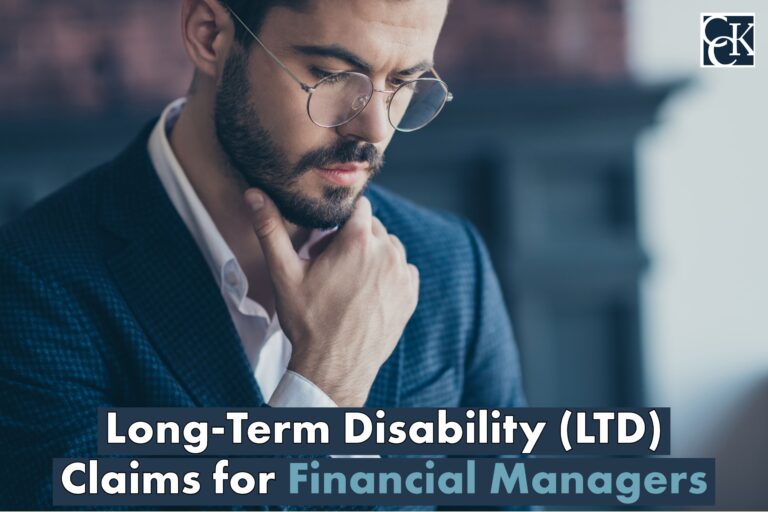Long-Term Disability (LTD) Claims for Financial Managers

If you are a financial manager suffering from a debilitating medical condition that is making it difficult (or impossible) to work, you may be able to file for long-term disability (LTD) benefits. If you have such a policy, you can file a claim with your insurance company to receive benefits that can protect a percentage of your pre-disability earnings. However, obtaining such benefits is not always the easiest process.
There are an estimated 681 thousand financial managers in the United States, and this number continues to grow. In short, a financial manager must oversee the finances of a company by creating financial reports; advising on financial decisions within a company; performing data analysis; forecasting future financial situations; and more.
It is evident how valuable a financial manager is to a company, so it is important to understand when it is necessary to file for LTD benefits. A financial manager must have sharp cognitive skills, but a medical condition — even a minor one — can cause these skills to diminish. This can have far-reaching effects within a company. In this article, we will discuss what you need to know as a financial manager filing for long-term disability benefits.
Why is Long-Term Disability Insurance Important for Financial Managers?
Financial managers are skilled workers necessary for the operation of many businesses across the country. As such, they must first acquire a bachelor’s degree (usually in finance, accounting, or economics). Typically, they must also have around five years of real-world business experience before beginning their career. A lot of time is spent acquiring the skills necessary to embark on such a career. So, when a medical condition sidelines their livelihood, it can be devastating.

If a person does not have long-term disability insurance, they may have limited options for financial assistance. Some financial managers may qualify for Social Security Insurance Disability (SSDI) benefits, but this is not a guarantee of approval. Therefore, it is vital to have an LTD policy.
There are two ways in which a financial manager may obtain a long-term disability policy. First, they may receive their policy through their employer. An employer-given policy is called a “group policy” and is governed by a federal law known as ERISA. A person may also obtain an LTD policy through the insurance company directly by buying it themselves. These types of policies are called “individual policies” and are not subject to ERISA. It is important to note that it is possible to have both types of policies simultaneously.
If a financial manager believes they have a group policy, they should inquire with a member of their company’s human resources department. If there is a group policy included in the benefits package, human resources can let them know and provide all necessary plan documents.
Likewise, if a financial manager believes they may have an individual policy, they must first look at their bank statements. If there are premium monthly payments to an insurance company, they may have an LTD policy. If they see such payments, they can contact the insurance company directly; if there is a long-term disability policy, the insurer will provide the plan’s documents.
Types of Financial Managers
The material duties of a financial manager’s job are important for a claim. These duties include the daily tasks associated with being a financial manager. However, this does not always mean the duties of the person’s specific job with their specific employer. Rather, insurance companies usually look at the material duties as it relates to the national economy. Further, some material duties — such as arriving at work on time — may not be as obvious to claimants as others.
Nevertheless, the duties of a financial manager may differ depending on their particular position. Several types of financial managers exist, such as:
- Cash Managers oversee the cash flow of a business, which includes projected cash flow; they must advise businesses on whether they can invest money or whether they need to take out a loan, among other duties.
- Credit Managers supervise a company’s credit, which includes setting credit criteria and overseeing credit ceilings.
- Controllers create financial reports, forecast a company’s finances; analyze balance sheets and income statements; and typically oversee certain departments within a company, such as the accounting and/or budget teams.
- Risk Management Specialists, as their name implies, manage the financial risk at a company to try and avoid (or offset) financial loss.
- Treasurers oversee a company’s budget and ensure that they meet its financial goals. Moreover, treasurers create and implement strategies to raise capital and develop plans for mergers and acquisitions (when necessary).
Understanding the Definition of Disability
Before filing a claim for long-term disability benefits, it is crucial to understand the policy itself. LTD policies contain a lot of invaluable information, including limitations and exclusions, specific filing deadlines, and more. One of the most important pieces of information contained therein is a definition of disability. The definition of disability lays the groundwork for a successful claim.

In short, the definition of disability is what a claimant must prove their condition meets to receive benefits. Typically, there are two types of definitions a financial manager may encounter: an “own occupation” definition and an “any occupation” definition.
The own occupation definition asks whether the claimant can perform the duties of their specific job, i.e., their own job. As mentioned earlier, this is usually whether the claimant can perform the duties of their job as defined in the national economy.
The any occupation definition, conversely, asks whether the claimant can perform the duties of any job at all. In other words, is the claimant “totally disabled” from working any job whatsoever? This definition is usually more difficult to prove.
It is important to note that some “any occupation” definitions may contain a “gainful component.” The gainful component can make proving an “any occupation” definition easier.
The gainful component looks at the earnings that a claimant made before becoming disabled to determine what constitutes a “gainful occupation.” A gainful occupation, usually, is a job in which the claimant could still make 60 to 80 percent of their pre-disability earnings. So, if a claimant could perform the duties of a job but the job would fall beneath this threshold, they would still be considered disabled by their policy.
What Do You Need to Establish an LTD Claim?
A financial manager who wants to establish a claim must be cognizant of the requirements. Some of these requirements include:
- The notice of claim: This notifies the insurance company of the claimant’s intent to file an LTD claim and is the first step in initiating the claim process.
- The claimant forms: Claimants must fill out forms to receive benefits. These forms allow claimants to describe their condition and provide other necessary information. Moreover, these forms will include the claimant statement; the attending physician statement; and the employer statement.
- Filing deadlines: A long-term disability policy requires claimants to file their initial claim within a certain period from when their disability began. This period varies from policy to policy. If a claimant misses this deadline, they may lose their right to file for benefits.
- Evidence: To prove a medical condition meets the definition of disability, claimants must submit evidence. Evidence can include medical records; specialized statements from treating physicians; witness statements; vocational evaluations; and more.
Establishing a claim can be overwhelming for some claimants. It is possible, however, for financial managers to handle their claims on their own. Yet a long-term disability lawyer can help ensure no common mistakes are committed, and they can help collect and submit all evidence on behalf of the claimant. Insurance companies do not always look at every claim neutrally, so it is beneficial to consult with an LTD attorney who can keep such companies accountable.
What Happens if the Insurance Company Denies a Long-Term Disability Claim?
There are myriad reasons why an insurance company may deny a long-term disability claim. For example, some insurers surveil claimants to find “inconsistencies” within the claim. Nonetheless, it is always possible to receive a denial of an initial claim. Unfortunately, this is more common than some claimants may think. While receiving a denial is disheartening, it is not the end of the road.

Every claimant who receives a denial of their initial claim has the right to appeal. They will receive a denial letter from their insurer. It is vital that they review this letter closely. Their appeal should directly address this denial letter to help fill in any gaps that the original claim had.
Moreover, if a claimant is appealing a group policy, they must remain cognizant of ERISA, which has its own deadlines and regulations. One important aspect of ERISA is that the administrative appeal is typically the last time in which new evidence may be put on the record. In other words, if the appeal fails and the claimant must go to litigation, the court usually relies on the evidence already submitted.
Chisholm Chisholm & Kilpatrick Can Assist You with Your Claim
Some claimants may decide to handle these claims and appeals on their own, but it is beneficial to consult with a long-term disability insurance attorney. Financial managers are vital members of any company. If they are not working at their top level, then mistakes can happen. These mistakes can often be detrimental to the financial stability of a company.
If you are a financial manager facing the reality of not working due to a medical condition or injury, you must consider filing for long-term disability benefits.
Chisholm Chisholm & Kilpatrick understands how frustrating this process can be and wants to help. We have over 30 years of collective experience and can help you no matter where you are in the process.
Call CCK today at (800) 544-9144 for a free case evaluation. We will review your case and see if we can help.
About the Author
Share this Post

